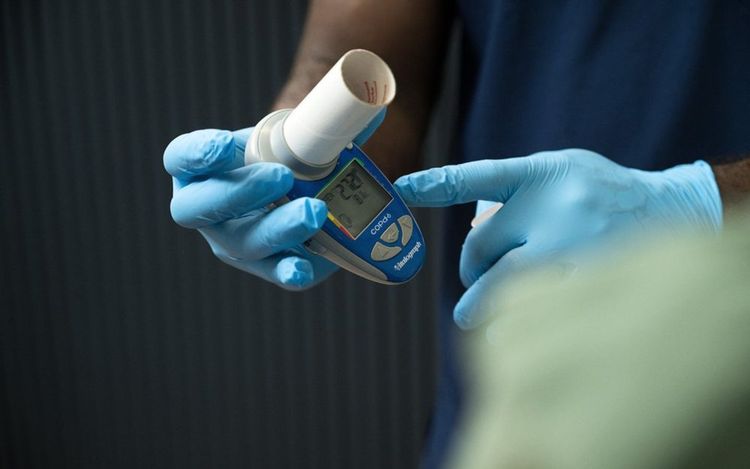Private Fitness Assessment
Because your health matters.
The value of regular exercise in improving quality of life is now well recognised. It can help reduce the risk of certain conditions as we age, like heart disease, high blood pressure and high cholesterol. In addition, it can help improve sleep, mood, and general wellbeing.
Understanding more about your current fitness level can be beneficial whether you currently exercise regularly, are trying to get back to peak fitness following an injury, or just want to exercise more frequently to improve your general wellbeing.
A fitness assessment is a valuable diagnostic tool that can help measure your existing fitness levels, helping you develop a realistic exercise training plan to achieve your health and fitness goals.
Our private fitness assessment is a quick, easy, and accurate way to discover key insights into your current level of fitness.
Explore our packages and book online today.
USPs

1.
Fast, accurate results
2.
Competitively priced testing within 20 minutes of your home
3.
Detailed, personalised Results Report
4.
Access to our 24/7 GP service with all test packages
How it works

1. Select and book your package
View our health test packages and book a full body private health check. All our individual tests can be added to any of our private health check packages. . Just call our team on 0800 652 2183 before your appointment to add an extra test.
2. Make an appointment
Choose the venue, date and time that suits you. With over 2000 appointments available nationwide every week, you're sure to find a convenient time, date and venue.
3. Attend your appointment
A trained Health Assessment Specialist will carry out your blood test. The whole process only takes around 20 - 30 minutes.
4. Fast, accurate results
Your results will be available 24/7 through our online dashboard, My Wellness. You will receive an email notification as soon as your results are ready for viewing. Processing times vary by test, with some results accessible on the dashboard in as little as three days.
What is a fitness assessment?
A private fitness assessment evaluates your current levels of fitness. This can help provide you with a baseline from which you can create a bespoke training plan to help you achieve your health and fitness goals. It can also help identify underlying health issues you may not be aware of.
During a fitness assessment, you will undergo a series of tests to measure your:
- Heart rate - before and after exercise
- The percentage of oxygen in your blood
- Your VO2 Max cardiovascular score
Heart rate measurement
Testing your heart rate provides insights into your resting heart rate as well as how well your heart recovers following exercise. During a private fitness assessment, your heart rate is tested at various points, usually at rest before exercise commences and after exercise. For most healthy adults, a normal resting heart rate is between 60 to 100 beats per minute. Generally, a lower resting heart rate is associated with more efficient heart function and better cardiovascular fitness.
Percentage of oxygen in blood measurement
The percentage of oxygen in your blood is measured during a fitness assessment, as this can provide a helpful indication of your physical fitness. Generally, the fitter you are, the better your body is at getting oxygen into the bloodstream. Blood oxygen level is usually measured as a percentage and should ideally range between 95 to 100%.
VO2 Max cardiovascular measurement
Your VO2 Max cardiovascular score is also assessed during a fitness assessment, as this is widely accepted as the best measure of cardiovascular fitness and endurance. A VO2 Max cardiovascular score measures how much oxygen your body uses while exercising. The more oxygen you inhale, the more energy your body can use and the higher your VO2 Max cardiovascular score. VO2 Max cardiovascular score can be especially helpful for people planning to take on endurance events like a marathon or triathlon.
Why should you have a fitness assessment?
A private fitness assessment can be beneficial for anyone looking to learn more about their fitness. It can provide vital insights into existing fitness levels and in some circumstances, help identify underlying health issues.
A fitness assessment can be especially helpful for people who:
- Feel fatigued or light-headed after exercise
- Feel tired or lethargic upon waking up in the morning
- Get short of breath from day-to-day activities like walking up the stairs
- Experience pain or discomfort during gentle exercise
- Know heart disease runs in the family
- Are returning to exercise after a break
- Are taking on a specific fitness or endurance challenge, like a marathon or triathlon
What does a fitness assessment involve?
Our private fitness assessment involves having a series of tests before and after a Step Test exercise to assess your general fitness level.
The Step Test is designed to measure a person’s aerobic fitness. You are required to step up and down a step for three minutes to increase your heart rate so that your fitness can be assessed.
During the assessment, we measure your heart rate, the percentage of oxygen in your blood, and how well your body utilises oxygen, known as a VO2 Max cardiovascular score.
Measuring your heart rate
Your heart rate is measured at rest before you start the Step Test and again after you complete it. This ensures you get a reading of your resting heart rate and how well your heart recovers following exercise. Generally, healthy adults have a resting heart rate between 60 and 100 beats per minute. A lower resting heart rate is associated with more efficient heart function and better cardiovascular fitness.
Measuring the oxygen in your blood during exercise
The percentage of oxygen in your blood is measured using a pulse oximeter, a device that attaches to your finger and measures how much oxygen is in your blood. The device is worn during the test to assess how your oxygen levels change in response to exercise. Blood oxygen level is usually measured as a percentage and should ideally range between 95 to 100%.
Exclusions and Advice
This test involves stepping on and off a step for three minutes and is only recommended for customers who have good balance. The test is not available to customers with very high blood pressure or for customers who experience chest pain on exercise.
Private health checks for complete peace of mind
Our full body private health checks are perfect for busy people who want to take a proactive approach to monitoring their health and wellbeing. Our tests are quick, accurate, convenient and completely stress-free. There is no waiting for an appointment, safe clinical procedures, no embarrassing questions, no long travel times and no busy waiting rooms.
Our tests are conducted by trained health assessment specialists at over 350 venues across the UK and Ireland, ensuring accurate professional health checks within 20 minutes of your home.
Any individual tests can be added to any full body health check. Just book one of our full body private health assessments and call us before your appointment to add an extra test.
Need help? Call free on 0800 652 2183 to speak to one of our team.
FAQs
Our private fitness assessment is designed to help you understand more about your current level of fitness. During the assessment we measure your resting heart rate, your heart rate after exercise, and the level of oxygen in your blood. You’ll also receive a VO2 Max cardiovascular fitness score, which is widely accepted as the best single measure of cardiovascular fitness and endurance. Plus, your results will tell you how your fitness level compares to the average for your age and gender.
A fitness test can be booked separately or added to any of our other tests. We recommend booking a fitness assessment alongside our Full Body Health MOTs, to provide you with a comprehensive overview of your general health and fitness levels. In addition to a wide range of health tests, following your appointment, with our full body health MOTS, you receive a personalised Results Report and free 24/7 GP helpline access for an entire year.
Our fitness assessment is designed to fit your schedule and take minimal time out of your busy day.
We run our affordable private health checks from high quality venues across the UK and Ireland. Simply find a location near you and book an appointment online today.
Full preparation instructions will be provided in writing when you book a private fitness assessment. There is no need to complete any specific training prior to the test as the idea is to provide you with insights into your existing fitness levels.
